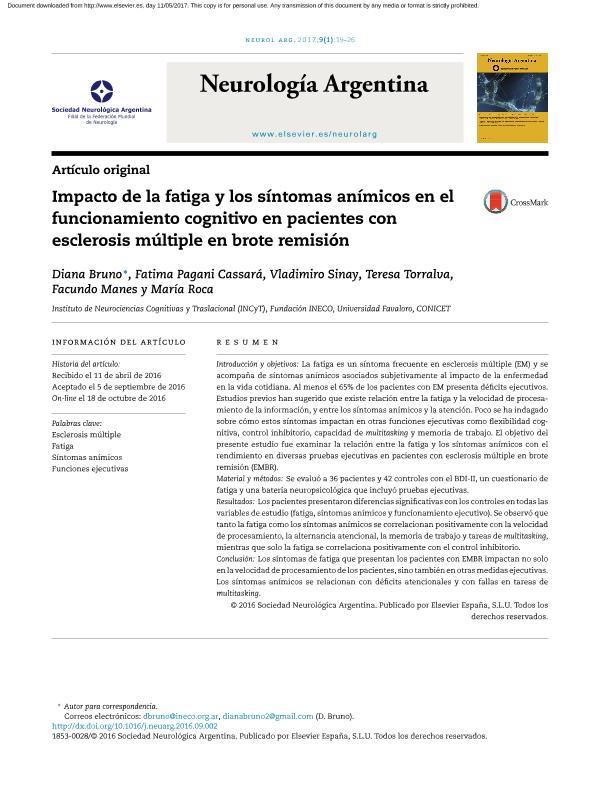Artículo
Introduction and objectives Fatigue is a common symptom in multiple sclerosis (MS) and is accompanied by mood symptoms subjectively associated with the impact of the disease in daily life. At least 65% of patients with MS present executive deficits. Previous studies have suggested that there is a relationship between fatigue and information processing speed, and between mood symptoms and attention. Little has been researched into how these symptoms impact on other executive functions, such as cognitive flexibility, inhibitory control, multitasking ability and working memory. The aim of this study was to examine the relationship between fatigue and mood symptoms with various executive performance tests in patients with RRMS. Material and methods 36 patients and 42 controls were assessed with the BDI-II, a fatigue questionnaire and a neuropsychological battery that included executive functions. Results Patients showed significant differences as compared with controls in all study variables (fatigue, mood symptoms and executive functioning). Both fatigue and mood symptoms correlate with processing speed, attention alternation, working memory and multitasking ability, while only fatigue correlates positively with inhibitory control. Conclusion The symptoms of fatigue experienced by patients with RRMS impacted not only on patients? processing speed but also on other executive measures. Mood symptoms are associated with attention deficits and multitasking ability impairments. Introducción y objetivos
La fatiga es un síntoma frecuente en esclerosis múltiple (EM) y se acompaña de síntomas anímicos asociados subjetivamente al impacto de la enfermedad en la vida cotidiana. Al menos el 65% de los pacientes con EM presenta déficits ejecutivos. Estudios previos han sugerido que existe relación entre la fatiga y la velocidad de procesamiento de la información, y entre los síntomas anímicos y la atención. Poco se ha indagado sobre cómo estos síntomas impactan en otras funciones ejecutivas como flexibilidad cognitiva, control inhibitorio, capacidad de multitasking y memoria de trabajo. El objetivo del presente estudio fue examinar la relación entre la fatiga y los síntomas anímicos con el rendimiento en diversas pruebas ejecutivas en pacientes con esclerosis múltiple en brote remisión (EMBR).
Material y métodos
Se evaluó a 36 pacientes y 42 controles con el BDI-II, un cuestionario de fatiga y una batería neuropsicológica que incluyó pruebas ejecutivas.
Resultados
Los pacientes presentaron diferencias significativas con los controles en todas las variables de estudio (fatiga, síntomas anímicos y funcionamiento ejecutivo). Se observó que tanto la fatiga como los síntomas anímicos se correlacionan positivamente con la velocidad de procesamiento, la alternancia atencional, la memoria de trabajo y tareas de multitasking, mientras que solo la fatiga se correlaciona positivamente con el control inhibitorio.
Conclusión
Los síntomas de fatiga que presentan los pacientes con EMBR impactan no solo en la velocidad de procesamiento de los pacientes, sino también en otras medidas ejecutivas. Los síntomas anímicos se relacionan con déficits atencionales y con fallas en tareas de multitasking.
Impact of fatigue and mood symptoms on cognitive functioning in patients with Relapsing-Remitting Multiple Sclerosis
Bruno, Diana; Pagani Cassará, Fatima; Sinay, Vladimiro; Torralva, Teresa; Manes, Facundo Francisco ; Roca, María
; Roca, María
 ; Roca, María
; Roca, María
Fecha de publicación:
01/2017
Editorial:
Elsevier
Revista:
Neurologia Argentina
ISSN:
1853-0028
Idioma:
Español
Tipo de recurso:
Artículo publicado
Clasificación temática:
Resumen
Palabras clave:
Executive Functions
,
Fatigue
,
Mood Symptoms
,
Multiple Sclerosis
Archivos asociados
Licencia
Identificadores
Colecciones
Articulos(OCA HOUSSAY)
Articulos de OFICINA DE COORDINACION ADMINISTRATIVA HOUSSAY
Articulos de OFICINA DE COORDINACION ADMINISTRATIVA HOUSSAY
Citación
Bruno, Diana; Pagani Cassará, Fatima; Sinay, Vladimiro; Torralva, Teresa; Manes, Facundo Francisco; et al.; Impact of fatigue and mood symptoms on cognitive functioning in patients with Relapsing-Remitting Multiple Sclerosis; Elsevier; Neurologia Argentina; 9; 1; 1-2017; 19-26
Compartir
Altmétricas



